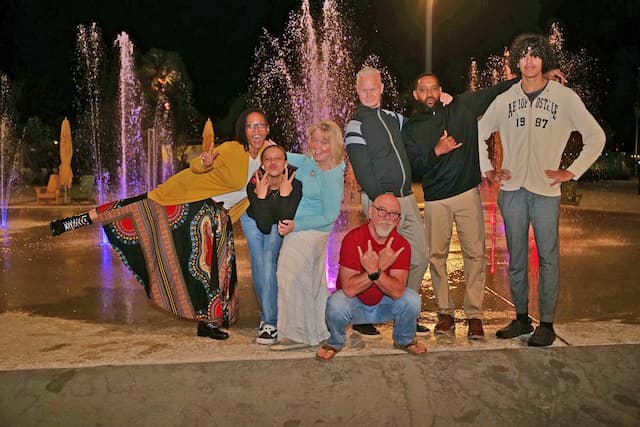Sin’s Corruption of Our Conduct
All false religions lie to us about man. While most of them concede that man has not reached perfection, they refuse to acknowledge the bare sinful facts of life and history. They insist on offering a system of human achievement that can please God. Only God’s Word tells us the painful yet loving truth that we cannot save ourselves—that the corruption of sin thoroughly permeates every facet of human existence.
In Romans 3:10–17, the apostle Paul lays out his indictment against mankind pointing out that the effects of Adam’s fall have corrupted our entire nature (Romans 3:10–12). He then points out how that inherent sinfulness spills over into our speech (Romans 3:13–14).
Paul’s reading of the indictment turns next to the problem of human conduct: “Their feet are swift to shed blood, destruction and misery are in their paths, and the path of peace they have not known” (Romans 3:15–17). Citing Isaiah 59:7 (“Their feet run to evil, and they hasten to shed innocent blood”), he singles out the crime of murder and charges all humanity with the guilt of that crime.
The sin of murder is indeed woven into the fabric of human history. The first child born to Adam and Eve slew his own brother. A wicked bloodthirstiness infects the entire race. And if you wonder how the charge applies to all without exception, remember what Jesus said about murder. He cited the sixth commandment (“You shall not murder”) and noted the penalty (“Whoever murders will be in danger of the judgment” [Matthew 5:21, NKJV]). Then He said,
But I say to you that everyone who is angry with his brother shall be guilty before the court; and whoever says to his brother, ‘You good-for-nothing,’ shall be guilty before the supreme court; and whoever says, ‘You fool,’ shall be guilty enough to go into the fiery hell. (Matthew 5:22)
The apostle John made the point as explicit as possible: “Everyone who hates his brother is a murderer” (1 John 3:15).
Humanity’s penchant for hatred and violence has left a trail of destruction throughout history, and Paul notes that fact by returning once more to Isaiah 59:7–8: “Devastation and destruction are in their highways. They do not know the way of peace.” The expression rendered “devastation and destruction” literally means “shattering calamity.” The idea is more than mere wretchedness (though it certainly includes that.) It signifies actual, painful, physical suffering. And there’s no denying that man-made calamity and self-inflicted misery have always been at the center of human experience. In his classic commentary on Romans, early nineteenth-century Scottish commentator Robert Haldane wrote, “The most savage animals do not destroy so many of their own species to appease their hunger, as man destroys of his fellows, to satiate his ambition, his revenge, or cupidity [inordinate greed].” [1] As Paul summarizes, “The path of peace they have not known” (Romans 3:17).
Paul concludes his indictment of the human race with one last phrase taken from the Psalms: “There is no fear of God before their eyes” (Romans 3:18). That is a quotation from Psalm 36:1, a psalm of David regarding the transgressions of the wicked.
Here is both the motive underlying human guilt and the consummate expression of human depravity. Because the very essence of foolishness lies in a failure to fear God. “The fear of the Lord is the beginning of wisdom” (Psalm 111:10; Proverbs 9:10) “The fear of the Lord is to hate evil” (Proverbs 8:13). “And by the fear of the Lord one keeps away from evil” (Proverbs 16:6). Of all the evils this string of Old Testament references attributes to fallen humanity, none is more despicable than the shameless, fearless, apathetic contempt people display toward their Creator and Judge. Of all the defects that mar fallen humanity, this is the most damning of all.
The Verdict
The conclusion of the matter is clear and inescapable: “Now we know that whatever the Law says, it speaks to those who are under the Law, so that every mouth may be closed and all the world may become accountable to God” (Romans 3:19). The guilty verdict is incontrovertible.
One thing is conspicuously missing here that would normally be found in any courtroom scene. The accused have offered no defense. That’s because there is no defense. “By the works of the Law no flesh will be justified in His sight; for through the Law comes the knowledge of sin” (Romans 3:20). We stand guilty as charged. We have nothing even remotely credible to offer in our defense.
To borrow words from the prophet Isaiah: “Woe is me, for I am ruined! For I am a man of unclean lips” (Isaiah 6:5). He was one of the best of the Old Testament prophets, and yet he had to confess that his throat was, indeed, an open sepulcher.
All of us stand guilty under the law of God and before the bar of divine justice. Every mouth is stopped. Meanwhile, a righteous judge has one responsibility: Uphold the law.
This brings us back to that seemingly insoluble dilemma. God, the lawgiver and perfect Judge, cannot simply overlook humanity’s sin. “He who justifies the wicked and he who condemns the righteous, both of them alike are an abomination to the Lord” (Proverbs 17:15). God cannot lower the impossibly high standard of His own perfect righteousness in order to accommodate humanity’s sin. Sin must be punished, and the wages of sin is death. Sinners have a debt they could never hope to pay.
If we stopped right there, no one would have any reason to think the gospel is good news. Thankfully, Scripture doesn’t stop there. Paul’s lengthy discourse on sin (Romans 1:18–3:20) is the heavy lifting required of a gospel preacher before he proclaims the glories of Christ’s life, death, and resurrection. Once Paul established the necessarily dark backdrop of human depravity, the scene was set for the gospel to shine forth. And that is what Paul proceeded to do: point us to the only solution, a solution alien to ourselves but gloriously ordained by our Creator.
But now apart from the Law the righteousness of God has been manifested, being witnessed by the Law and the Prophets, even the righteousness of God through faith in Jesus Christ for all those who believe; for there is no distinction; for all have sinned and fall short of the glory of God, being justified as a gift by His grace through the redemption which is in Christ Jesus; whom God displayed publicly as a propitiation in His blood through faith. This was to demonstrate His righteousness, because in the forbearance of God He passed over the sins previously committed; for the demonstration, I say, of His righteousness at the present time, so that He would be just and the justifier of the one who has faith in Jesus. (Romans 3:21–26)











